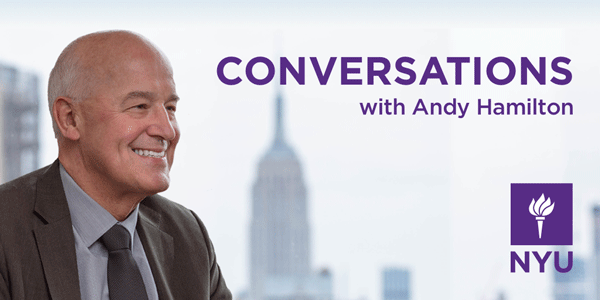In my left ear is Andrew Hamilton, the president of NYU, a man who made over a million dollars last year and lives in a penthouse apartment on Washington Square. In my right ear is Rubén Blades, Steinhardt’s first ever Scholar-in-Residence, a musician, politician, activist and lawyer.
They speak together on Hamilton’s new podcast “Conversations.” The podcast will air once a month during the school year and feature students, alumni and professors. The first episode was released on Feb. 22 with Blades as the inaugural guest.
Where Hamilton is loud, Blades is calm; where Hamilton interrupts, Blades listens. I am struck by the contrast between these two men, who both came to the United States from vastly different regions: one hailing from a wealthy colonial power, the other having left the home he loved in the wake of a military coup.
Yet despite their differences, both are filled with passion. Hamilton for the university he serves, and Blades for his home country. Before he is any of his titles — from presidential candidate to Grammy Award-winning singer — Blades is an optimist. Whether it be in the field of music, law or public office, Blades believes in the power of people to create social change.
Throughout the conversation, Hamilton and Blades share laughter, but their interaction never feels genuine. They make it a bit too clear that they have a rapport with one another, that they are getting along and having fun. However, underneath this veil of social nicety, I see an interviewer desperate to connect with his interviewee.
Five minutes in, Blades quotes his grandmother. “You can be poor, physically,” she once told him. “You can be poor materially, but never be poor spiritually, never be poor intellectually.”
Blades is a fascinating man. Although he went to law school, his career did not last long; he fled Panama’s military dictatorship in 1974 for Florida, where his law degree “meant nothing.” He instead turned to his childhood passion for music before returning to Panama to run for president in 1994. Blades received the third highest number of votes and later served as the country’s Minister of Tourism.
Later, Hamilton and Blades discuss Blades’ musical career. The Steinhardt scholar’s brilliance is masked behind shyness. At 14:45, Hamilton uses Blades’ music as a transition. The tune is upbeat and beautiful, but does make reference to political realities. When asked about the political bend to his music, Blades denies it is there — he simply wants to write songs about his environment, both “as a protagonist” and “as a witness.” His political commentary surpasses ideology or propaganda: it is honesty in lyrical form.
Around 18:00, we learn how Blades uses his music as a form of legal and political engagement. Blades both transgresses and defies the labels that others put upon him. He does not identify as a protest singer, but he does not shy away from it, either. While in law school, Blades wanted to hold public office — he viewed law as a gateway to social change, and politics as “an act of self-defense.”
When Hamilton asks if he will run for president of Panama again, Blades says he will never shy away from public office.
The educator and the activist then turn to discuss pressure that students face from their parents and from their environment: “It’s okay to make mistakes,” Blades says, lamenting the high expectations that students face to succeed in hypercompetitive fields. Hamilton worries about the effects of social media on his students: he notes that the “constant barrage of commentary and criticism” makes it harder for students to fail and to grow from that failure.
Blades spoke of his sometimes poor performance in school, noting he failed music and math. He seems to have a sense of humor about himself and his failures; his jokes are never braggadocious, nor at the expense of others — he takes everything seriously except himself. Hamilton, on the other hand, takes his position in the podcast very seriously. He is performing for a different audience — his employees, his students — and for a different world.
The podcast ends after 31 minutes with Blades saying, “Thank you, Mr. President.” I notice the sincerity in his voice and the respect he has for the man he is speaking with. As the elevator music fades out, I am left with the impression that this incredible man — equal parts musician and leader — respects his counterpart. But I am left surprised that Hamilton doesn’t go out of his way to reciprocate that respect.
Yet perhaps they show respect in different ways. As a debater, I show respect for ideas by engaging with them, which occasionally includes interrupting. I see myself in Hamilton’s qualities: his privilege and pride, his desire to do right by the world. In Blades, I see my aspirations: to love and be loved by the world, to make art that matters to its audience, to instigate and nurture social change.
A version of this article appeared in the Monday, March 25, 2019, print edition. Email Leah Block at [email protected].


























































































































































